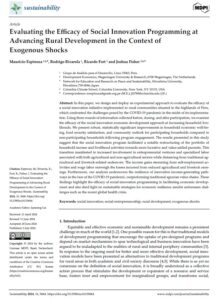Evaluating the efficacy of social innovation programming at advancing rural development in the context of exogenous shocks
| Year | : | 2024 |
|---|---|---|
| Author/s | : | Mauricio Espinoza, Rodrigo Rivarola, Ricardo Fort, Joshua Fisher |
| Area/s | : | Rural development and agriculture |
Espinoza, M., Rivarola, R., Fort, R., & Fisher, J. (2024). Evaluating the efficacy of social innovation programming at advancing rural development in the context of exogenous shocks. Sustainability, 16(13), 5664. https://doi.org/10.3390/su16135664
In this paper, we design and deploy an experimental approach to evaluate the efficacy of a social innovation initiative implemented in rural communities situated in the highlands of Peru, which confronted the challenges posed by the COVID-19 pandemic in the midst of its implementation. Using three rounds of information collected before, during, and after participation, we examine the efficacy of the social innovation economic development approach at increasing household livelihoods. We present robust, statistically significant improvements in household economic well-being, food security satisfaction, and community outlook for participating households compared to non-participating households following program engagement. The results presented in this study suggest that the social innovation program facilitated a notable restructuring of the portfolio of household income and livelihood activities towards more lucrative and value-added pursuits. This transition manifested in increased involvement in entrepreneurial ventures and specialized labor associated with both agricultural and non-agricultural sectors while distancing from traditional agricultural and livestock-related endeavors. The income gains stemming from self-employment activities and wage labor outweigh the losses incurred from reduced agricultural and livestock earnings. Furthermore, our analysis underscores the resilience of innovative income-generating pathways in the face of the COVID-19 pandemic, outperforming traditional agrarian value chains. These findings highlight the efficacy of social innovation programming in facilitating economic development and also shed light on sustainable strategies for economic resilience amidst unforeseen challenges such as the recent global health crisis.







